Can a High Protein Diet Cause Constipation?
July 16, 2024
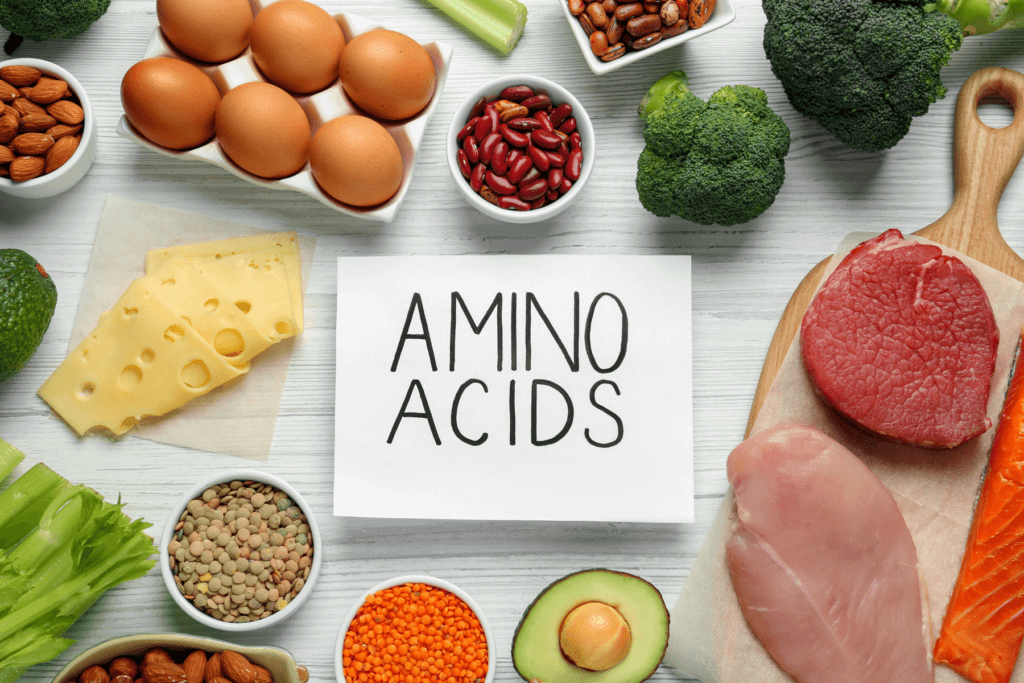
Protein, along with carbohydrates and fats, is considered one of the most necessary nutrients to the body. It is essential for so many processes in the body, including growth, muscle and cell repair, chemical reactions, protection and muscle contraction. Protein also acts as transport carriers throughout the body for things like vitamins, minerals, and oxygen.
Can eating too much of this important nutrient cause constipation?
What is Protein?
Protein is a large nutrient that is made up of smaller nutrients called amino acids. The breakdown of protein for digestion starts in the mouth. It then passes to the stomach and small intestines where it is broken into small amino acid chains by enzymes. Enzymes release amino acid chains from the food until they become single amino acids that are ready for absorption in the bloodstream.
There are 20 amino acids that make up protein. However, the body can only make 11 of these amino acids itself. The remaining 9 “essential” amino acids must be acquired through diet. Animal proteins like meat, fish, eggs, and dairy contain all 9 essential amino acids. Most plant-based proteins, like beans, nuts, and seeds, only contain some essential amino acids.
It was once thought that the body needed to eat certain amino acids combinations together in order to create “complete proteins.” However, it’s now known that this simply isn’t the case. A varied diet with enough calories, proteins, and essential amino acids from plant and animal foods throughout the day will help ensure the body has enough resources to make the non-essential amino acids too.
How Much Protein Do I Need?
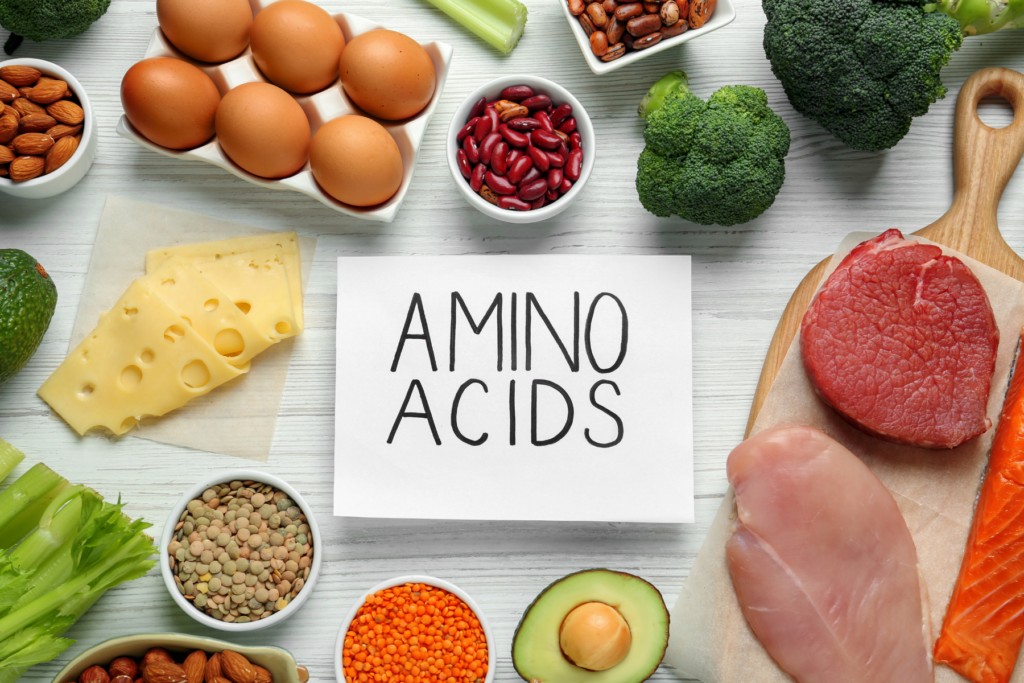
When there are too few amino acids or when calorie intake is inadequate, the body may have to break down its own muscle for energy or to get the amino acids it needs.
Most active individuals and athletes get enough protein to meet their basic needs and prevent deficiency. The recommended daily allowance (RDA) for protein to prevent deficiency in the average adult is 0.8 gm/kg body weight. For a 140 pound female, this would be a minimum of 51 gm/day. It’s probably not surprising to hear that even most health professionals feel that this reference is too low for optimal health, and especially optimal sports performance.
Active women and athletes often need much more protein to prevent deficiency, enhance muscle repair after exercise, and promote beneficial muscle growth. Optimal intake to help with body processes, especially around training, can improve sports performance and optimize health. For active individuals and athletes, the American College of Sports Medicine, recommends active adults and athletes consume 1.2-2.0 gm/kg/day. Some recommendations for athletes even go up to 2.4 gm/kg/day depending on the sport and training regimen.
Is It Possible to Have Too Much?
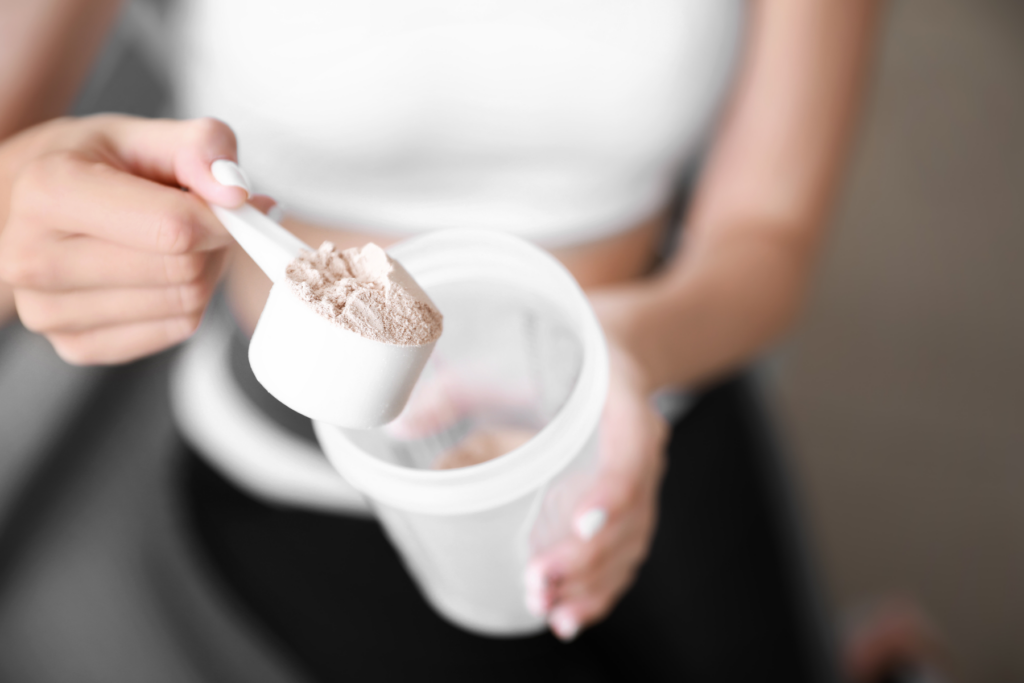
Most active individuals, including female athletes, often fall within the above range when it comes to protein intake. However, high protein diets are becoming increasingly popular and prioritized. With this, higher than necessary intakes are also becoming more common in athletes at all levels. The popularity and use of protein supplements especially can make surpassing your needs and recommended amounts even easier than ever before.
Currently, there is no upper limit for protein set in the Dietary Reference Intakes. The body doesn’t store excess protein for future. Therefore, all excess is broken down and stored as body fat or glycogen for future energy reserves. However, that doesn’t mean a high protein diet can’t have negative effects, especially when it comes to your digestion.
Protein and Constipation
There may be a link between a high protein diet and constipation, but not for the reasons you may think.
Hydration
When it comes to digestion and high-protein diets, hydration is key. If you consume more than your body needs, it will flush out the excess nitrogen (found in the amino acids) from your body along with water. One very small study showed that hydration status was negatively impacted in the individuals that received the high protein diet (3.6 gm/kg/day).
Fiber
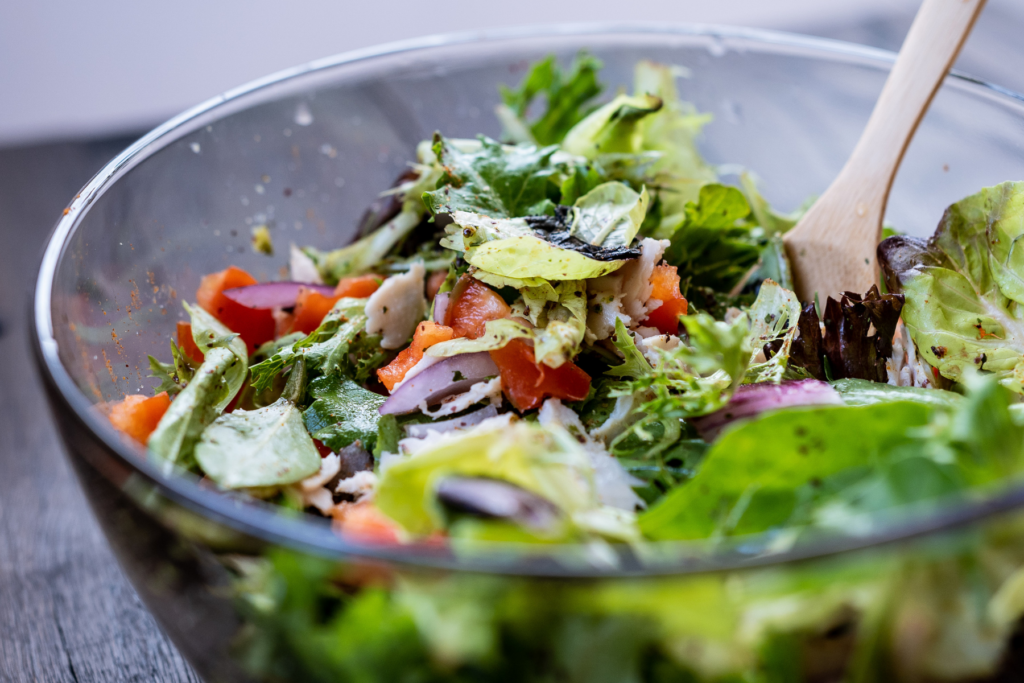
It also may not be just the high protein intake that messes with digestion. Instead, it may be what the high protein intake means for the rest of the diet.
For instance, incorporating more protein may mean crowding out other essential nutrients like fiber and healthy fats. Both fiber and fat can ease digestion by bulking up stool and acting as a digestive lubricant.
Fiber intake on a high protein diet may be lower as a result of lower intakes of whole grains, legumes, fruits, and vegetables. Fat intake may also be negatively impacted, especially when protein is being more consumed from lean meat sources, protein supplements, and bars or shakes.
Gut Health
Altering the ratios of carbohydrates, fat, and protein in the diet can end up having an impact on the microbiome. Studies have shown that there is a particular range of protein intake that seems to have an optimal impact on health, while eating too much or too little protein can have a negative effect on the microbiome.
High protein, low carbohydrate diets in particular may have a negative impact on the gut micobiota. However, the short and long term effects of certain protein amounts and sources on the microbiome is still being investigated.
Protein Shakes

Last but not least, it’s popular these days to use supplement shakes to help meet your protein needs. However, these shakes may contain ingredients that can easily disrupt your digestion. For instance, many protein shakes are whey-based, which can be hard to digest for those that are lactose intolerant. Artificial sweeteners are also common ingredients in supplement shakes and can have both short and long-term effects on the gut. For instance, a recent 2022 study found that sucralose, saccharine, and stevia can all impact the composition of the gut. This is why a diet that provides plenty of variety and is flexible with different food sources is most important for short and long-term health.
What Can You Do?
For the above reasons, some people may experience more constipation on a high protein diet. In fact, constipation may be one of the many signs that your diet needs to change.
To help keep your digestive system running smoothly and you feeling your best both physically and mentally, here are a few tips to help optimize your digestion no matter what you’re eating.
Stay Hydrated
Active individuals need about 11-16 cups of fluids per day. Most Americans consume about 20% of this amount through fluid-rich foods, like yogurt, fruit, and vegetables. However, it’s important to stay on top of your overall hydration goals each day with a variety of fluids, especially water.
Check out more reasons why hydration is especially important for women in our blog post Why Hydration is Essential for Active Women.
Eat Plenty of Fiber
Both men and women need fiber daily to help promote regular digestion. Men should aim for 38 grams of fiber per day and women should aim for 25 grams per day. Fiber is also one of those examples of too much of a good thing, so be sure not to eat too much fiber either. This essential nutrient can be found in fiber-rich sources like whole grains, beans, legumes, fruit, vegetables, and nuts and seeds.
Include Variety
Variety is the spice of life, and the key to a healthy diet. You can eat the healthiest foods in the world but if you’re only ever eating the same thing day in and day out, then your diet is not going to give your body the variety that it needs. Focus on a variety of protein sources, healthy fats, carbohydrates (including whole and refined grains), fruits, and veggies.
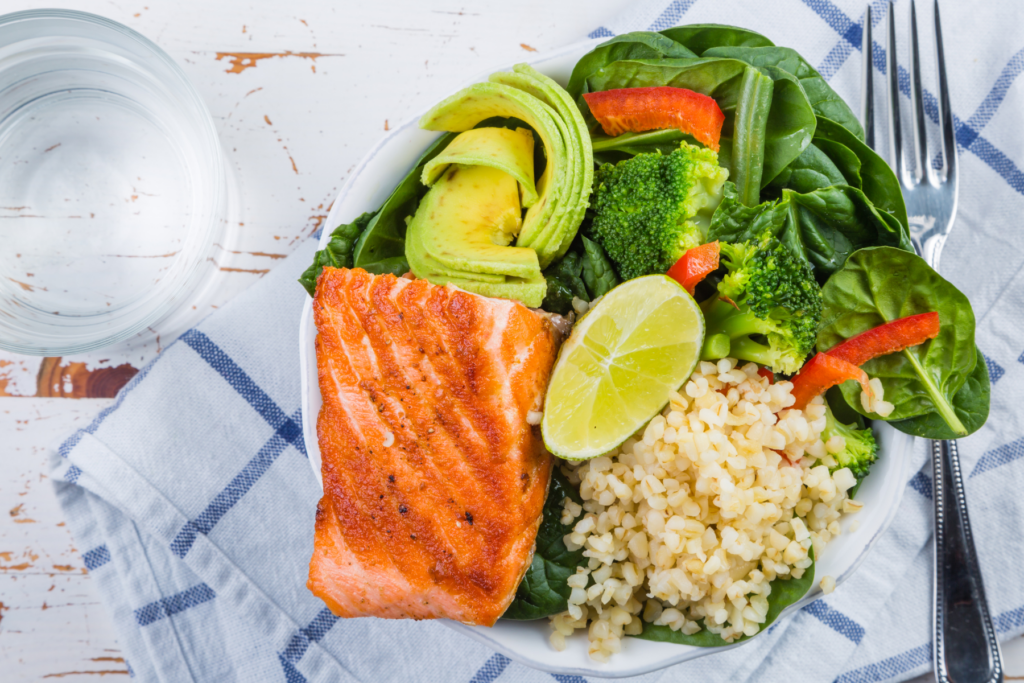
Replenish Electrolytes
If your workouts are long or you’re a heavy sweater, then it’s important to replenish electrolytes in order to stay hydrated and keep digestion regular. Replacing electrolytes can help more efficiently re-hydrate the body by pulling necessary fluid into cells. After a sweaty workout, consider salting your food or relying on one of our favorite electrolyte supplements, like Drip Drop, Buoy, or Cure.
Eat To Fuel Your Lifestyle
Active people need to replenish their body’s energy stores just as much as fuel up on important nutrients. Aim to eat an adequate amount of calories everyday with enough carbohydrates to replenish energy stores, enough protein to recover and maintain (or build) lean body mass, and healthy fats to keep the body healthy.
In Conclusion…
A healthy balance of macronutrients is key for any diet.
Are you looking for more information about what a healthy diet looks like in order to fuel your active lifestyle? We are sports dietitians who are on a mission to give you diet-free nutrition advice that can help you reach your goals, simplify nutrition, and stay active for the rest of your life. Check out our services here.
Sources:
American Dietetic Association Complete Food & Nutrition Guide 4th Edition 2012
https://www.ncbi.nlm.nih.gov/pmc/articles/PMC8310928